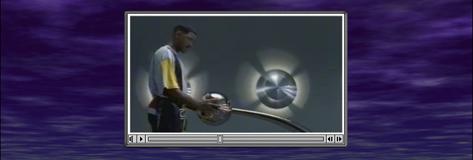
Ursula Hentschlaeger
Zelko Wiener
Vice Versa. Mediatised
Projections in the Worlds of Science-Fiction Movies
1998
This work aimed at focusing on a
mediatised notion of the mirror, which can mainly be defined on
the basis of distinctions: If, in visions of the future, the
traditional mirror still serves as
1. an
instrument of observation, self-knowledge and exposure, and
2. as a means
to condense interior worlds and dream worlds then the
"new" ways of mirroring, which are eventally always
mediatised project-ions, find their equivalents in
3. digital
instruments (of control) or as
4.
constructions of reality in a fictitious cyberspace.
BACKGROUND
OBSERVATION
Summary
Some of the films discussed here fulfil
more than the one criterion under which they have been
subsumed. Thus, the idea of the "replicant" in Blade
Runner places the movie in a category that has to do with the
issue of biological mirroring which has not been dealt with
here but is nonetheless one of today's most explosive issues.
The interesting thing about compiling the material for the
CD-ROM was that most of the films contain aspects relating to
the mirror theme. The question as to whether the phenomenon of
the mirror was still relevant in visions of the future was
answered by the reception of the movies itself. After all, how
should the mirror, which looks back on such a long
epistemological history, lose its importance? Mirror images
like the ones supplied by scans, or information archives, for
that matter, are certainly not limited to science fiction, and
they offer fundamental and burning complexes of problems which
are to do with dynamism in society.
Contribution, in: Ohne Spiegel leben
("Living without a mirror"), ed. Manfred
Faßler, Fink 2000
INTRERIORWORLD
CONTROL
CONSTRUCTION
CONCLUSION





